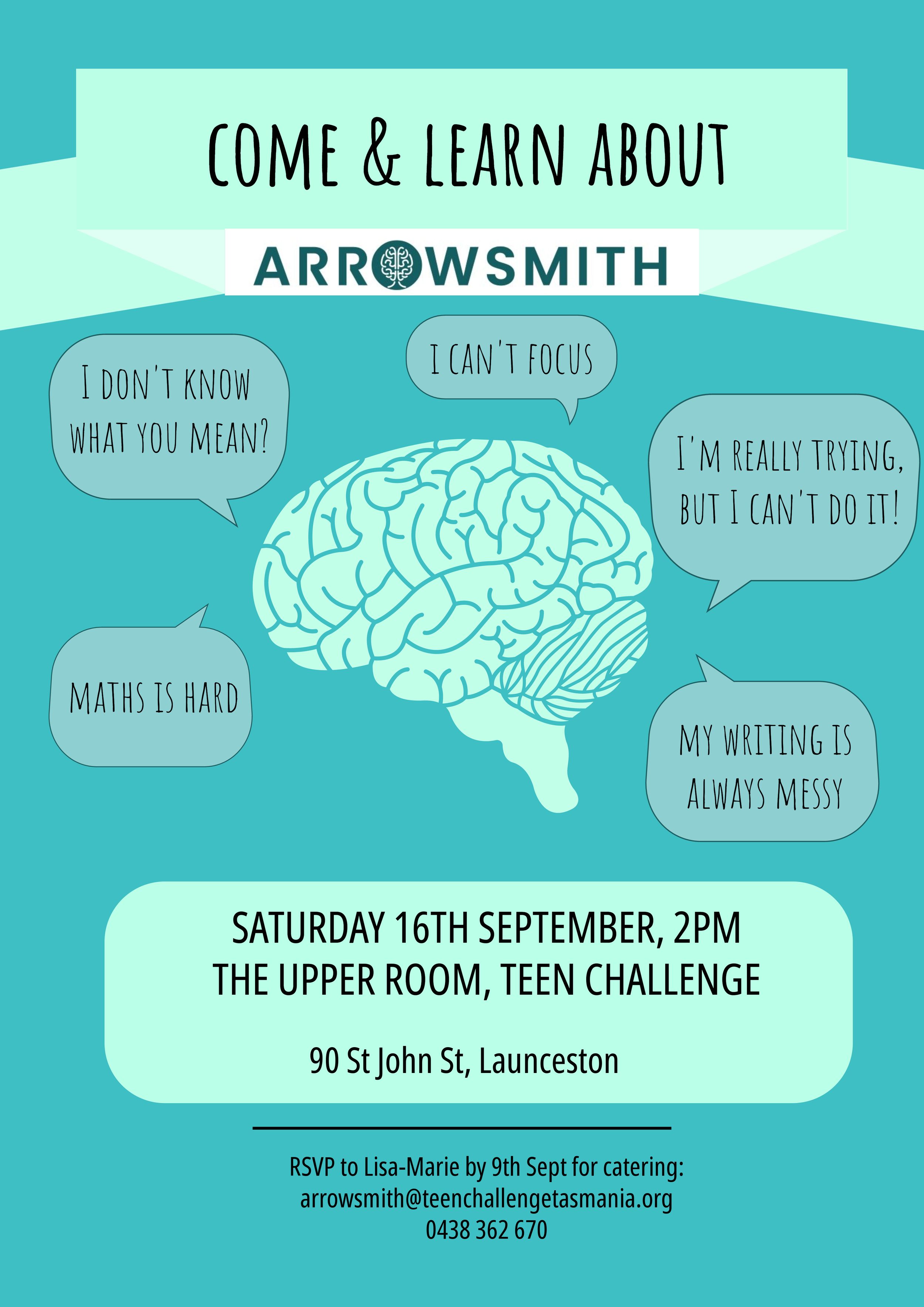Arrowsmith Information Session
Join us for afternoon tea and learn more about how the Arrowsmith Program could help you or a loved one with learning difficulties. This world renowned, evidence based program is now available in Launceston, Tasmania. Here’s a little more info to see if this may be worth checking out.
Improving Cognitive Capacity for a Better Future
Have you ever wondered why you can do complex mathematics, like abstract algebra, yet have trouble remembering a phone number?
Have you ever wondered why someone can spell well and read words on a page accurately, yet not understand what is being read? Or why your very intellectual friend has so much trouble with social interactions?
The interplay of various cognitive functions in our lives can give us a clue to the answer.
Underlying everything we do over the course of the day is our brain. Whether we are talking, walking, scratching our nose, planning a budget, leading a project, or interacting with our friends - our brain is engaged.
Over the course of the day we use all aspects of our brain – no part is unimportant.
Networks of Neurons Come Together to Perform Specific Functions Such As:
processing information
navigating in space
forming and retaining memories
recognizing familiar faces
learning motor plans required for writing
understanding number and quantity underlying scheduling time and budgeting
discriminating speech sounds
interpreting emotions
seeing relationships and making the connections necessary for insight and comprehension
visually retaining symbol patterns necessary for reading, spelling and all visual template learning
thinking non-verbally
Arrowsmith Defines These as 'Cognitive Functions'
Cognitive functions are the brain processes necessary for all that we do.
Each cognitive function has a specific job and depending on the activity we are engaged in, different cognitive functions work together to perform the task.
Like a symphony orchestra where each instrument has a specific role to play in contributing to creating the music, each cognitive function has a role to play in contributing to our various learning processes.
Let’s Look at Reading as an Example
We need to develop motor plans for smooth eye-tracking of printed text, we need to be able to remember the symbols that make up words, we need to be able to attach sounds to the symbols, we need to develop motor and sensory plans for articulation when reading out loud.
So, reading requires multiple cognitive functions to work in concert.
It is the same for all learning – combinations of cognitive functions work together for each of us to learn and perform all of our daily activities.
Let’s explore these cognitive functions and how they play out in the learning process.
What Happens When Cognitive Functions
Aren't Operating as They Need to?
There are times when it is obvious that some cognitive functions, or a combination of functions, are not as strong as they should be.
It becomes evident in school, at work, in independent tasks, in social settings.
Some people are diagnosed as having learning disabilities (learning difficulties).
Some are diagnosed with more specific diagnoses such as dyslexia (reading difficulties), dysgraphia (writing difficulties), dyscalculia (math difficulties), non-verbal learning disabilities, memory difficulties, auditory processing disorder, executive function disorder, attentional problems (ADD/ADHD).
Some individuals may not have a diagnosis yet know that something in their brain is interfering or holding them back from achieving their goals.
Arrowsmith looks under those labels.
At Arrowsmith, we have the unique ability to examine and identity a person’s strengths and weaknesses with their cognitive functions, building individualized programs that are designed to strengthen the underperforming functions - allowing individuals to overcome their learning challenges.
What Participants within Arrowsmith tell us:
“I couldn’t do Math in my head before, but I can now” (14 years old)
“When we are shopping, she can work out the cost of something, and how much it is if it’s half-price. She can also work out how much change she will receive.” (Parent of 14 year old)
“His teacher has noticed improvements at school and is very happy. His report this year is vastly better than it was last year! “ (Grandparent of 9 year old)
“I can follow and understand lectures better” (45 year old student)
I used to find it really hard to hold a conversation with them, it was really tiring because it was one sided. Now it’s totally different; it’s two-way and it’s enjoyable. When I asked them about the change, they said it’s because of Arrowsmith!” (observer of 21 year old)

